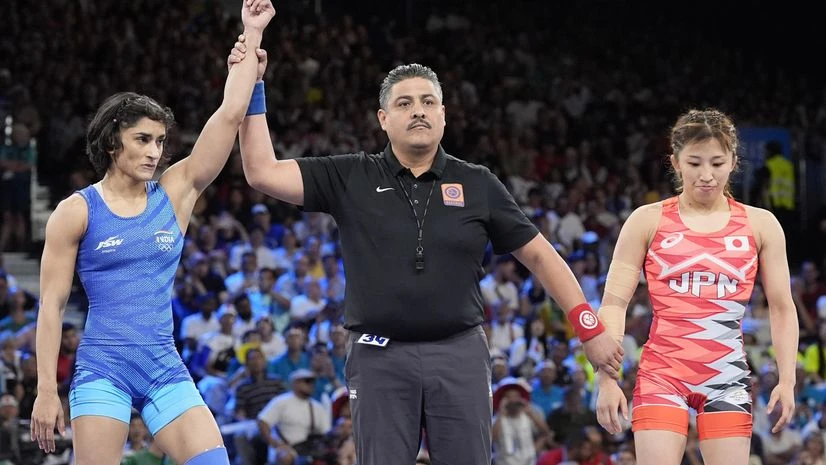Months before her long-cherished dream of winning an Olympic medal turned into reality, Vinesh Phogat was furious, but unwavering in the face of intimidation, police detention, backlash from a protest she was spearheading, and a smear campaign that sought to portray her in a negative light.
Instead of sinking into a miasma of despair, she unloaded on her detractors a torrent of angry responses, something that proved to be a blessing in disguise as she became India's first woman wrestler to reach the finals of the Olympics after two failed attempts over 12 years.
All along that tumultuous phase, she was convinced that her fight was just and in that, she prevailed too.
Then, as she trained her sights on booking a ticket to the Paris Olympics, a new set of challenges stared her in the eye, as if telling her to leave the scene for good.
She had to drop down to 50kg after competing in 53kg for more than five years, there were multiple issues with her trial bouts ahead the Olympic qualifiers, and then there was also the small matter of going through a knee surgery, years after an anterior cruciate ligament (ACL) tear at the 2016 Rio Olympics nearly ended her career.
For the feisty wrestler from Haryana whose road to the French capital was always riddled with hurdles, a lot was at stake. Mere mortals would have caved in, but she didn't.
Instead, she switched to top gear. It was a reflection of all the things that went into the making of Vinesh Phogat.
More From This Section
Finally, her extraordinary journey, from the street protests of Delhi to the podium in Paris, culminated in a historic medal, the colour of which will be known on Wednesday. For now, she has guaranteed herself a silver.
It's a perfect riposte to her detractors in the national federation who criticised her for her leading role in the prolonged protest against former Wrestling Federation of India chief Brij Bhushan Sharan Singh, who is accused of intimidation and sexual harassment.
The police got involved, the courts got involved, and the government too stepped in as the residents of the national capital got impatient with the protests that hindered vehicular movements in the heart of Delhi.
Around that time, her critics were convinced that warped ideas were bubbling in her head, but Vinesh, who is days away from turning 30, grew even more determined to carry on the fight thanks to her steely resolve and an unquenchable confidence in her ability.
These attributes went a long way in helping her win a medal in the world's biggest sporting spectacle, which, in a way, completed her decorated career.
It started with the trials where she forced the officials to let her compete in two weight categories and then went on to seal selection in 50kg.
Weeks later she secured Olympic qualification in the new division and in between also battled the spread of misinformation that she had tried to evade a dope test amid all the drama.
Considering the journey she has had to undertake in the recent past on her way to what she has achieved just now, just saying she is synonymous with courage and determination would not do justice.
To those who have been documenting her life and career, Vinesh Phogat deserves more than just a bunch of superlatives.
In recent years Phogat was fighting on two fronts: on the mat and off it. Her battles off the mat were in fact more challenging than the ones she grew up handling in her village in Balali. But, in a way, those off-field battles prepared her better to tackle her rivals in the competition.
Once in Paris, as luck would have it, she was pitted against Japanese wrestler Yui Susaki who had never lost a bout in her international career and is a four-time world Olympic champion.
But Vinesh, drawing from her struggles off the mat and using a perfect game plan, stunned the reigning Olympic champion in one of wrestling's biggest upsets.
Having tackled her toughest opponent in the competition, the Indian then beat eighth seed Oksana Livach of Ukraine to secure a berth in the semi-finals of the women's 50kg freestyle event.
In her moment of triumph, after everything she had faced, she lay on the mat, tears of joy rolling down her face.
But the job was not complete.
In the semifinals, Vinesh got the better of Cuba's Yusneylis Guzman Lopez to secure a medal and become the first Indian woman wrestler to reach the final at the Olympics.
From battling opposition from the villagers who considered wrestling to be a man's sport, losing her father at the age of just nine, to taking on powerful federation officials, Vinesh has faced innumerable hardships on her way to realising her dreams.
"Believe and you can fly," said wrestling's world body while congratulating her on social media.
She certainly is.
(Only the headline and picture of this report may have been reworked by the Business Standard staff; the rest of the content is auto-generated from a syndicated feed.)

)